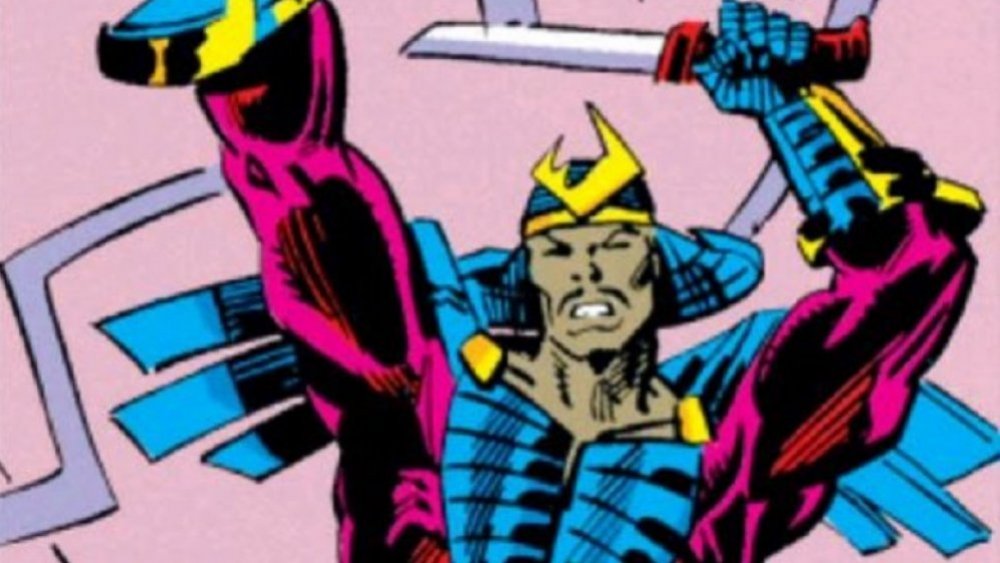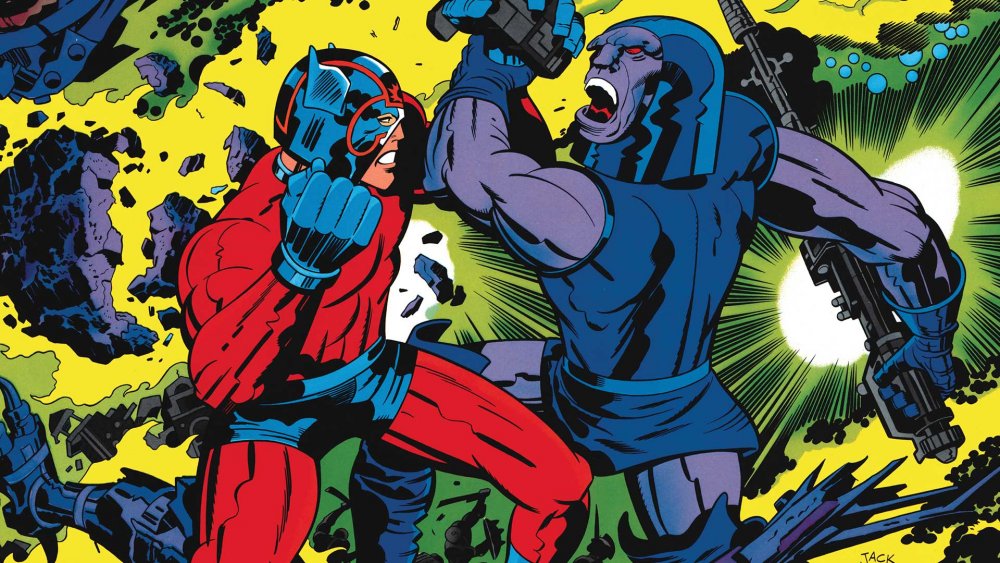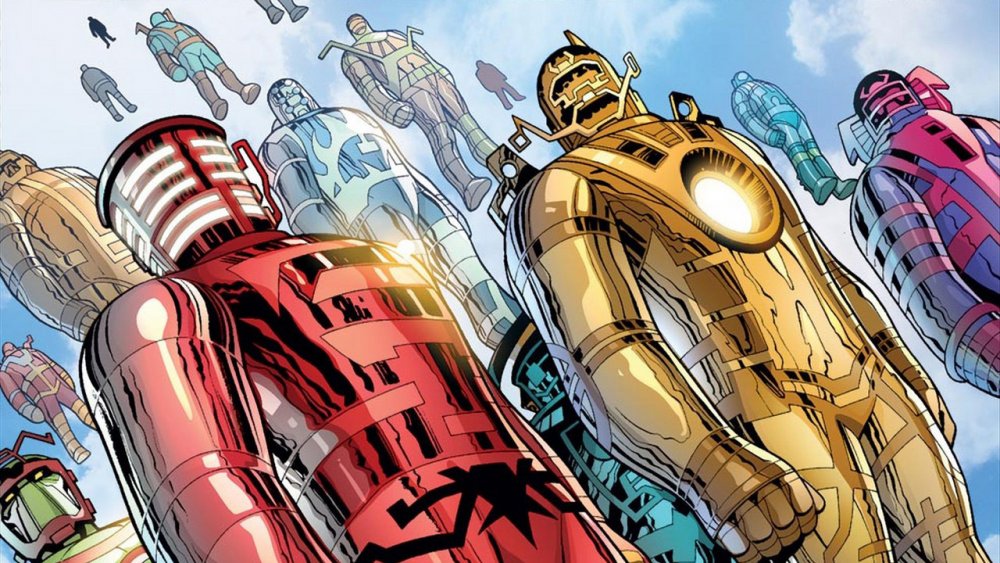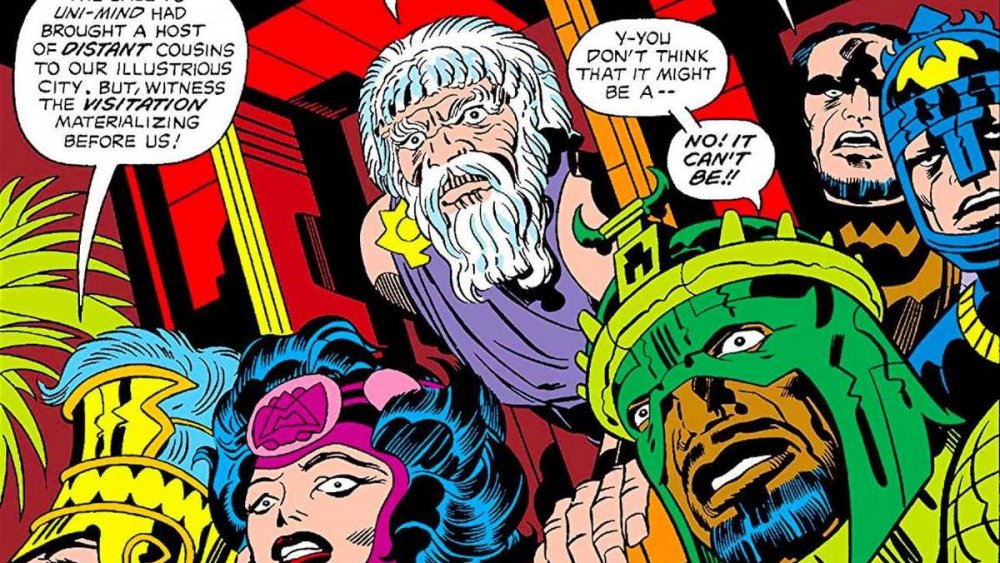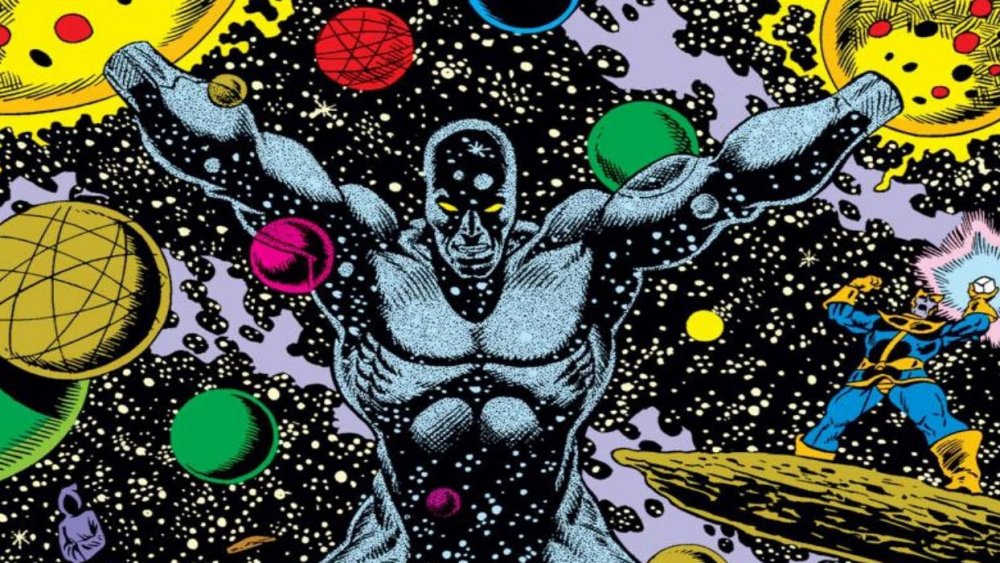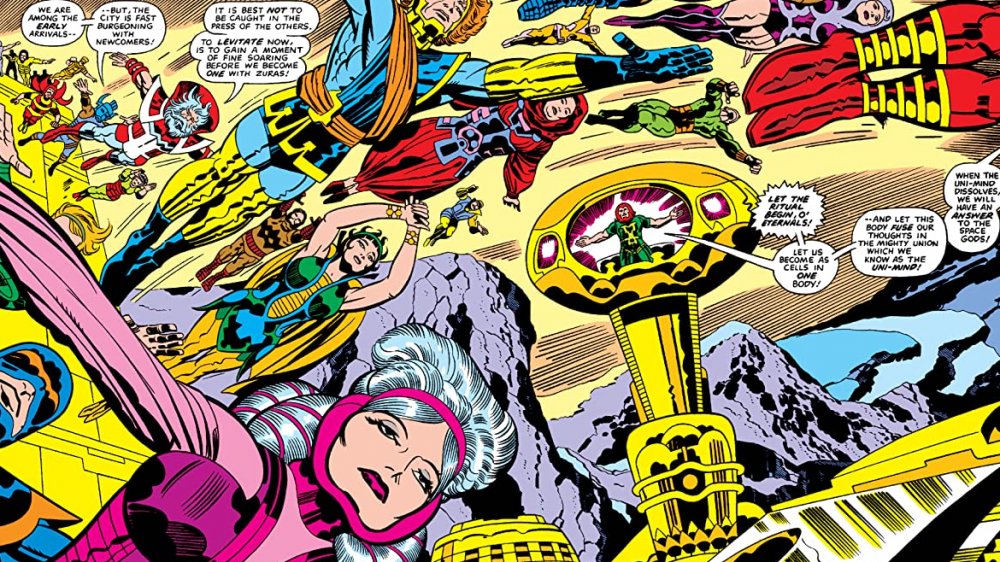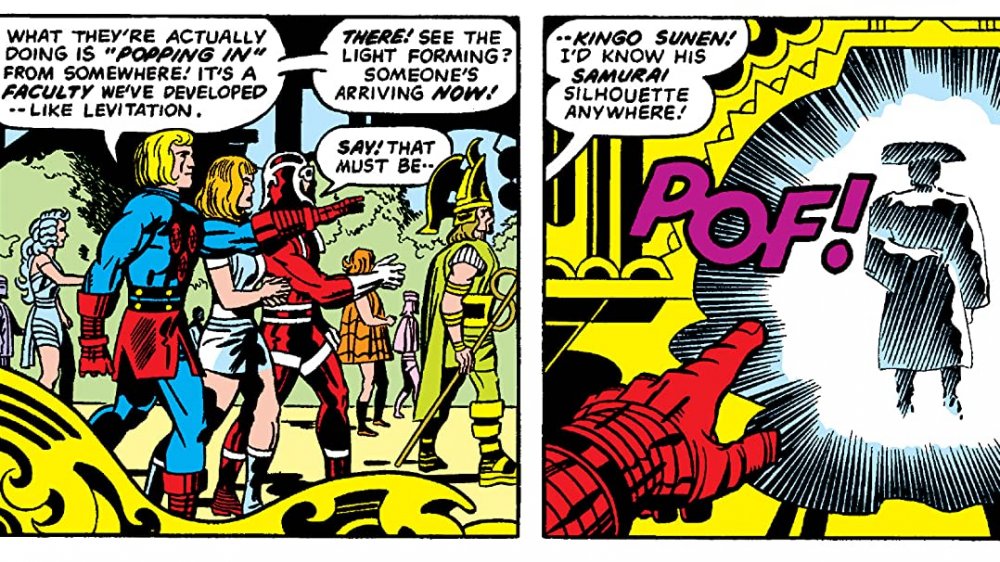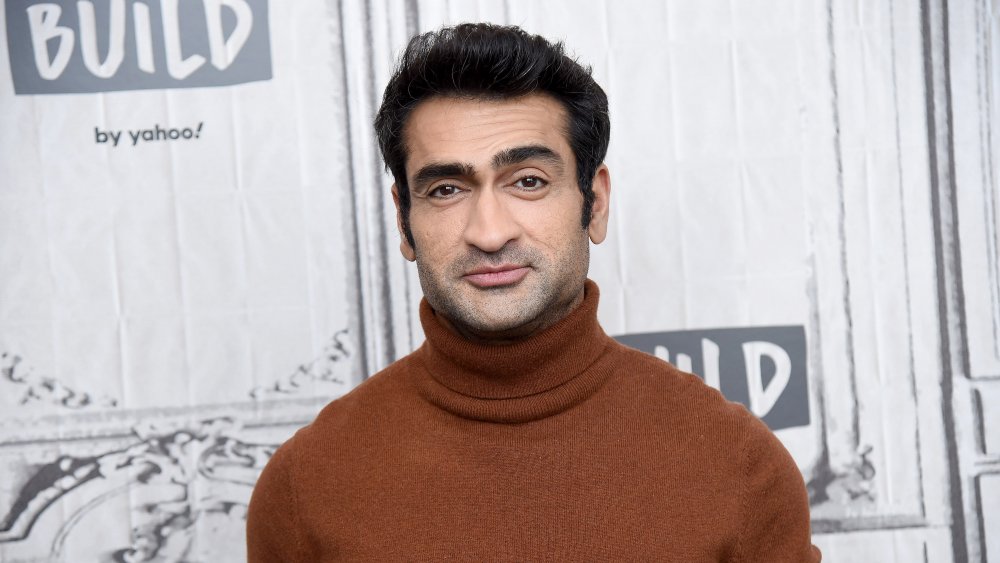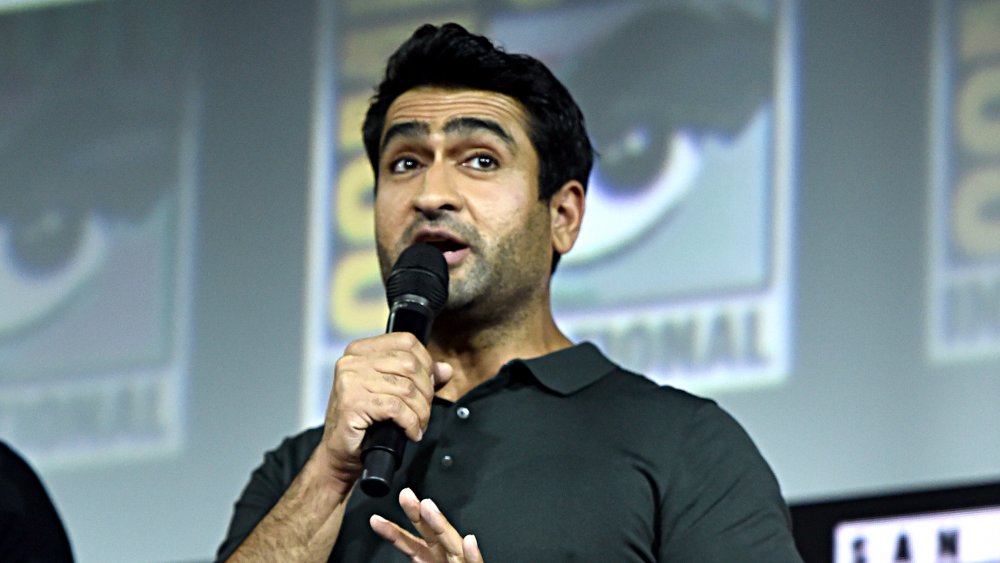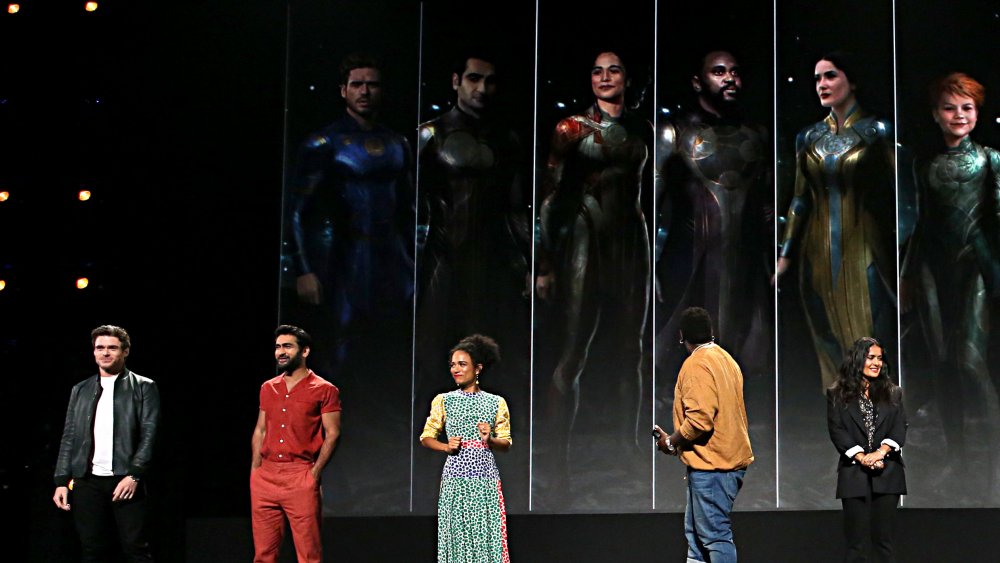The History Of Marvel's Kingo Explained
Adapting superhero comic books into blockbuster movies can be a bit of a tightrope walk. Screenwriters have to provide enough detail to satisfy the super-fans who have internalized these modern mythologies, while keeping things broad enough to bring in the casual moviegoer looking for a fun two hours. Prior to the days of Marvel's army of diehard defenders on the digital march, making four-color funnybooks into movies was asking to get shouted at from every direction.
But even in that earlier, angrier era, you couldn't ask for lower stakes than an Eternals adaptation. The original series ran from 1976 to 1978 for a mere 19 issues, and holds no significant place in the cultural imagination outside passionate Jack Kirby fans. Compared to Spider-Man, Thor, and Captain America, it's a blip. But don't let that make you think the Eternals aren't worth your time. They're obscure, sure, but they're also an absolutely fascinating part of the Marvel canon.
No one exemplifies their appeal better than Kingo. Compared to the out-in-front immortals like Sersi and Ikaris, Kingo is a bit more of a blank slate. But what's there is appealing as all get-out, and an encouragingly bonkers look into the cosmic shenanigans promised in the post-Endgame MCU. Join us as we explore all things Kingo, from his out-there origins to his career on the silver screen.
Jack Kirby's cosmic visions
Jack Kirby is called the King for a reason: His is unparalleled. The MCU already owes him an incredible debt, as he served as co-creator of many of its most popular characters. Captain America, the Hulk, Black Panther, the X-Men, the Fantastic Four, and Iron Man all sprang from Kirby's pencils.
That's more than enough to make him a first-ballot Hall of Famer. But Kirby didn't stop there: He pioneered the comics industry's transition from the Silver Age into the Bronze Age after decamping to DC in the early '70s. In his dizzyingly imaginative Fourth World comics, Kirby took superheroes to the farthest reaches of sci-fi myth-making, upping the stakes and the scale of their stories considerably while rendering it all in vivid splashes of celestial color. If your mind's eye brings up planet-sized beings strolling across psychedelic expanses of space when you think "1970s comics," you're probably thinking of Kirby. His work in this era has gone on to influence a whole generation of comic-reading oddballs, including Grant Morrison and Neil Gaiman, the latter of which penned his own Eternals run in the '00s.
Kirby returned to Marvel in 1976 to much rejoicing. Still interested in cosmic tales of gods and monsters, he embarked upon a story of a race of immortal beings hiding out on Earth. Thus began the Eternals.
The Celestials
The story of the Eternals starts out with a group known as the Celestials. Immensely powerful, impossibly old, and absolutely huge, these beings traveled around the newborn universe, tinkering with the life that they happened upon. They were created by the universe's original life form, an omnipotent intelligence known as the First Firmament, who acted out of loneliness and a desire for servants. The first group the Firmament created became known as the Aspirants, who were endlessly loyal to their creator. Another group, however, quickly showed signs of unrest. The First Firmament dubbed this second group the Celestials, and noted their desire to create a further universe beyond their simple, hierarchical existence. They even longed to create further orders of beings as the First Firmament had created them, as a way to expand the confines of reality.
The civil war that raged between the Aspirants and the Celestials nearly ended the entire universe. Ultimately, the First Firmament and its Aspirants fled into another universe, leaving only the Celestials behind. They were free to carry out their experiments throughout a universe in which they were suddenly the most powerful creatures.
The dawn of man
The Celestials' experiments on early humanity created two offshoot races. The first are the Eternals, who are classically beautifully and in possession of godlike abilities. Tapped into the cosmic energy of the universe, the Eternals are effectively immortal, impervious to poison, and immune to disease. There is very little they cannot do: Teleportation, mind control, and the transmutation of matter are all within their wheelhouse. They are, in short, gods, and their powers have put them eternally at war with the Celestials' other offshoot race, the Deviants. The Deviants are physically hideous and wildly divergent in their powers — a fact that has actually served as blessing and curse. Their rapid rate of mutation allowed the Deviants to develop advanced technology and establish control over the early ages of the Earth.
Despite the Deviants' rise to power, the Eternals flourished on Earth. They built a fabulous city called Titanos, created a thriving culture, and fostered human development. All was not well, however. The Eternals split over the question of whether to use their superior abilities and strength to conquer Earth's native humans. The brothers Kronos, who believed in leaving humanity alone, and Uranos, who wanted to conquer the planet, led armies on opposite sides of the issue. Eventually, Kronos prevailed, Uranos fled to an outer planet in the solar system (take a guess which one) and the remaining Eternals continued their peaceful co-existence with humanity.
An experiment gone wrong
The Eternals as we know them are incredibly hard to kill — you don't get a name like "Eternals" otherwise — but they didn't start out this way. At first, they possessed finite (if extremely long) lifespans and unique control over the aging process, but would eventually die on a timeline we could not comprehend. Their outright immortality, and many of their most impressive powers, came from early experiments that Eternals carried out on Earth.
Kronos, an Eternal of notable intelligence, was experimenting with cosmic energy when he lost control and caused a devastating explosion. The blast destroyed the city of Titanos and vaporized Kronos' body — but not his mind. Though the mistake was catastrophic, it also imbued the remaining Eternals with control over cosmic energy. The Eternals found that they were even more powerful, able to control their bodies down to the molecular level. Moreover, it revealed their ability to create the "Uni-Mind," a single, godlike being created when the Eternals unite their consciousnesses together.
Taking to the mountains
With Kronos rendered immaterial, the Eternals gathered to pick a new leader. The choice was between Kronos' two sons, Zuras and A'Lars. Zuras was chosen, and A'Lars fled to the moon Titan to avoid starting a civil war. As Titanos had been destroyed, the Eternals began looking for new places to live. They chose remote locations to maintain a remove from humanity, finally building three great cities. The first was Olympia, built in the mountains of Greece, which humanity would come to understand as Mount Olympus, home of the gods. The latter two were Polaria and Oceana, located in Siberia and the Pacific Ocean, respectively.
Eventually, the Celestials returned to Earth to carry out further experiments on their creations. This period is known as the Second Host, and was marked by mass suffering. The Deviants' long-bubbling resentment of their creators finally exploded, and they attacked the returning Celestials. The Celestials responded by leveling the Deviants' civilization. Their cities sank to the bottom of the ocean, the surface of the Earth was entirely reshaped, and most Deviants were killed. The survivors took refuge in underground cities. The Eternals, in contrast, escaped relatively unscathed, and even helped many humans survive the Celestials' attack.
The samurai who became a movie star
After the Celestials left for a second time, the Eternal known as Kingo Sunen was born. In the world of the Eternals, he's a relatively minor figure who hails from an Eternals settlement near modern-day Hokkaido, Japan's largest and northernmost prefecture. He followed the traditional path of the Eternals, hiding in the mountains to keep a distance between himself and the humans living there ... for a while. During the 16th century, Kingo strayed from the path in a major way when decided to follow the way of the samurai.
Kingo's engagement with humanity did not abate with time. As the 20th century saw the development of the movie industry, Kingo used his hands-on training to portray samurai characters in Japanese films. Contrary to other Eternals, who tend toward secrecy, Kingo relishes living in the spotlight. In his home country, he's a massive action star, the go-to guy for silver screen sword fights. He "loves nothing better" than living this way, and though his fellow Eternals might not share his proclivities, they do enjoy knowing the truth behind his pitch-perfect performances.
Live-action adaptation
Rather than being a Japanese action star, the MCU's Kingo will be a Bollywood A-lister. Pakistani-American actor and comedian Kumail Nanjiani will play Kingo, and has already garnered the character more attention than he's ever gotten. Principally, this is because he blew the internet's mind by revealing the ripped physique he's gained to better portray the cosmic immortal. But his interpretation of Kingo is attention-grabbing for other reasons as well. For one thing, The Eternals will mostly take place in modern times, as opposed to the ancient eras in which the Eternals battled the Deviants and were worshiped as Greek deities. Moreover, this Kingo's stardom is also a matter of strategy. As Nanjiani told the New Hollywood podcast, "A lot of it takes place in the present day. My character, for instance, is like 'OK, we're supposed to keep a low profile, no one should know.' So I become a Bollywood movie star, that's my secret identity. We're supposed to keep quiet, and I've become the biggest Bollywood movie star."
So, Kingo's hiding in plain sight by revealing to the world that he's incredibly athletic and seemingly superhuman, but keeping the source of his unbelievable abilities under wraps. This might sound goofy, but hey — do you look at The Rock and assume cosmic energy created those biceps? Plus, it's apparently going to result in a Bollywood dance sequence, so we're totally on board.
Bollywood Bruce Willis
Kumail Nanjiani has said that his inspiration for the character is a combination of Bollywood royalty and Bruce Willis' legendary performance as Die Hard protagonist John McClane. In an interview with Men's Health, he said he felt compelled to get in the best shape of his life to better represent South Asian superheroes. He did not want to be "the schlubby brown guy" — he wanted to be a superhero in every sense. Moreover, he wanted to create balance between the character's comedic tone and his insanely powerful abilities. As he remarked, "I was like, 'How can a character crack wise but still have tension, and not make it feel like you're making fun of the whole thing?'" His answer, apparently, was "get jacked."
Nanjiani used a real-life Bollywood star to illustrate what he wanted his body to look like: He showed his trainer a picture of Hrithik Roshan, a wildly successful Indian actor who has moved smoothly between superhero films, romantic dramas and critically acclaimed period pieces, while having a body that appears to be cut from granite. "I went to my trainer and said, 'I want to look like this guy," Nanjiani said. And boy howdy, did he accomplish his goal.
A grander scale
Nanjiani is a known comic geek who's been interested in a superhero role for some time — prior to Silicon Valley, he auditioned for Marvel's Agents of S.H.I.E.L.D. Nanjiani had also earned famed from The Meltdown with Jonah and Kumail, a Comedy Central series filmed in Los Angeles' Meltdown Comics. The series, which grew from the comic shop's long-running live shows, brought together Los Angeles' comic nerds and comedy fans. It's no wonder, then, that Nanjiani is jazzed to be in a Marvel movie.
"[I]t's really such a science-fiction story. It's a superhero story, but in some ways, it's the most sci-fi of all the Marvel movies and it's the most epic of all the Marvel movies," Nanjiani told Entertainment Weekly. "And the story spans thousands of years. So it's really not like any of the other Marvel movies." He went on to say that the movie recalls old-school Hollywood's massive blockbusters — a fitting trait, considering it's an adaptation of Jack Kirby's most grand-scale thinking. "I don't mean epic in the internet way, I mean epic in the old-school way," Nanjiani remarked. Now that sounds just about perfect.
